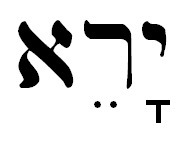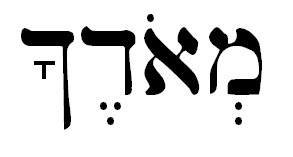by Lois Tverberg
The fear of the LORD is the beginning of wisdom, and the knowledge of the Holy One is understanding. (Proverbs 9:10)
 One word that comes up often in the Bible is the word “fear,” yareh, and especially in reference to God. For some, it has made them feel that the God of the Old Testament just wants human beings to be afraid of him. But then we read verses like,
One word that comes up often in the Bible is the word “fear,” yareh, and especially in reference to God. For some, it has made them feel that the God of the Old Testament just wants human beings to be afraid of him. But then we read verses like,
(Of the Messiah) … And he will delight in the fear of the LORD. (Isaiah 11:2-3)
and
The reward of humility and the fear of the LORD are riches, honor and life. (Proverbs. 22:4)
It is obvious from these verses that the “fear of the Lord” is a good, rather than a negative thing. The key to understanding these verses is to know that like many words, “fear” has a broader sense in Hebrew, encompassing very positive things like honor, respect, reverence, and worshipful awe. In fact, every time we read the words “revere” or “reverence” in our English translations, it is from the Hebrew verb yareh.
Rabbinically, the “fear of the LORD” was considered one of the greatest goals of a worshipper’s life. It means to always be reminded that God is watching, and to realize the importance of living according to his will, and to be reassured of his constant care. It does mean to realize that God will discipline those whom he loves (Revelation 3:19). But, the emphasis is on a positive, reverential relationship with God, not in terms of being terrified by him. If having a reverential awe of the Lord causes us to live with integrity and obedience to God, it will ultimately transform us.
In the fear of the LORD there is strong confidence,
And his children will have refuge.
The fear of the LORD is a fountain of life,
That one may avoid the snares of death. (Proverbs 14:26-27)
~~~~
See Listening to the Language of the Bible, by Lois Tverberg and Bruce Okkema, En-Gedi Resource Center, 2004. This is a collection of devotional essays that mediate on the meaning of biblical words and phrases in their original setting.
For a friendly, bite-sized Bible study of five flavorful Hebrew words, see 5 Hebrew Words that Every Christian Should Know, by Lois Tverberg, OurRabbiJesus.com, 2014 (ebook).





